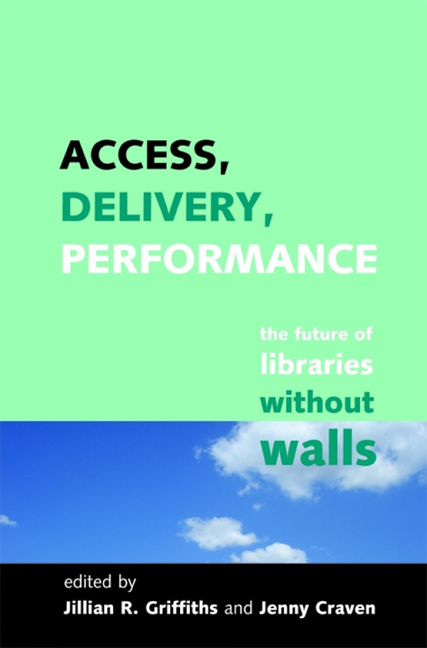Book contents
- Frontmatter
- Contents
- Contributors
- 1 Introduction
- 2 The Library Research Unit at the University of Lancaster, 1967–1972: a memoir
- Theme 1 Libraries, learning and distance learning
- Theme 2 Widening access to information
- Theme 3 Changing directions of information delivery
- 8 Institutional repositories in tertiary institutions: access, delivery and performance
- 9 Folksonomies to ontologies: the changing nature of controlled vocabularies
- Theme 4 Performance, quality and leadership
- Peter Brophy: a selected bibliography
- Index
9 - Folksonomies to ontologies: the changing nature of controlled vocabularies
from Theme 3 - Changing directions of information delivery
Published online by Cambridge University Press: 08 June 2018
- Frontmatter
- Contents
- Contributors
- 1 Introduction
- 2 The Library Research Unit at the University of Lancaster, 1967–1972: a memoir
- Theme 1 Libraries, learning and distance learning
- Theme 2 Widening access to information
- Theme 3 Changing directions of information delivery
- 8 Institutional repositories in tertiary institutions: access, delivery and performance
- 9 Folksonomies to ontologies: the changing nature of controlled vocabularies
- Theme 4 Performance, quality and leadership
- Peter Brophy: a selected bibliography
- Index
Summary
Introduction
Throughout a distinguished career as both practitioner and researcher, Peter Brophy has been concerned with the effective delivery of information resources to users and potential users. As both practitioner and researcher, he has been interested in the development of new services to users. There have been a number of recurrent themes throughout his work, among which are novel service delivery from academic libraries and the exploration of the possibilities of exploiting new information technologies in service delivery. Examples include BIBDEL Libraries Without Walls: the delivery of library services to distant users (www.cerlim.ac.uk/ projects/bibdel/index.php), and Franchise: Library Support for Franchised Courses in Higher Education (www.cerlim.ac.uk/projects/franchis/index.php). He explored the concept of the hybrid library in the HyLife project (www.ukoln.ac.uk/services/elib/projects/hylife/) and more recently the eMapps.com (www.eMapps.com) project has explored the use of mobile technologies to motivate active learning among primary school children across Europe. It is many years since Ranganathan first advocated ‘every reader his book’. Brophy has been a dedicated proponent of an updated version of this mantra, as evidenced by his work as practitioner and researcher and explored more widely in the conference series ‘Libraries without Walls’ of which he was a creator.
Although his concern has been with what might be termed the macro level of service delivery and exploration of the possibilities for new service development, those services have often been underpinned by matters of vocabulary and vocabulary control in its many guises. His emphasis has been on exploring technology, but I will argue that though technology offers new possibilities for service delivery, language is and will remain at the heart of effective information resource discovery and access. This is particularly the case in the English language with its vast vocabulary. Bryson (1990) has pointed out that this has been caused by its propensity to absorb words from many different languages and offers some fascinating examples of Anglo-Saxon nouns for which the relevant adjective has been imported from elsewhere: mouth/oral, book/literary, water/aquatic, town/urban. Examples such as these demonstrate the complexity of effective retrieval and explain why automated means may require forms of vocabulary control for many years to come; or more likely that there will remain a need for human involvement in the retrieval process and totally automated retrieval will remain an elusive ‘holy grail’.
- Type
- Chapter
- Information
- Access, Delivery, PerformanceThe Future of Libraries Without Walls, pp. 145 - 158Publisher: FacetPrint publication year: 2008



